 |
 |
|
NomCom special edition
2007 results |
|
This is a special edition of the ICANN magazine covering the choices made by the independent Nominating Committee to fill nine seats within the ICANN structure.
Those choices cover:
- Three new Board members
- Two members of the GNSO Council
- Three members of the ALAC, and
- One member of the ccNSO Council.
The call for statements of interest in these posts was put out on 1 February 2007 with a final deadline of 18 May 2007.
In total, 93 individuals applied (12 female and 81 male). Of them, 70 applied for Board positions, 29 applied for the GNSO Council, 27 for ALAC and 24 for ALAC. The geographic split saw 25 apply from North America, 23 from Europe, 23 from Asia-Pacific, 13 from African, and 11 from Latin America and the Caribbean.
All the successful applicants, listed below, will take up their positions at ICANN's 30th annual meeting in Los Angeles, starting on 2 November. We wish them all the best in their new roles.
For more information on the Nominating Committee, please visit: http://nomcom.icann.org.
|
|
 |
ICANN Board of Directors |
|
 |
The ICANN Board makes all final decisions pertaining to ICANN's work. It comprises 21 members - 15 voting and six non-voting. The Nominating Committee chooses eight of the voting members, a majority, over a three-year period.
Each of the three supporting organizations within ICANN chooses two voting members each, and the president (also the CEO) makes up the final voting member. The non-voting members are liaisons from each of the six advisory committees.
This year's selection is particular significant as the new Board members will be required to vote in a new ICANN chair following Vint Cerf's departure after eight years. That vote will take place at a public meeting of the Board on Friday 2 November.
The successful applicants will serve a three-year term on the Board and they are:
Harald Tveit Alvestrand (Norway, Europe)
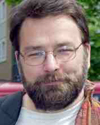 Harald Alvestrand is an Internet old-hand, having worked on one of the earliest networks in his homeland of Norway and then extensively within the Internet Engineering Task Force (IETF) since 1991.
Harald has written a number of RFCs, including RFC 1766, the first standard for language tags in Internet protocols. In the IETF, he was area director of Applications for three years, of Operations & Management for one year, and chair from 2001 to 2006. He was a member of the Internet Architecture Board (IAB) for two years.
He was also involved in the early days of ICANN, serving as alternate chair of the DNSO General Assembly from December 1999 to April 2001; and a member of the WIPO panel of experts on the DNS in 1998-1999.
Mr Alvestrand graduated from the Norwegian Institute of Technology (NTH), and has worked for, among others, Norsk Data, Cisco Systems and, currently, Google. He is a board member of NORID, the .no domain name registry, and the Unicode Consortium. He lives in Trondheim, Norway, and is married with three children.
"My main work on the board I would say will be to help make sure we have an understanding of the technical implications of what we decide, and what the social, economic and political consequences of those technical implications are."
Dennis Jennings (Ireland/UK, Europe)
 Dr Dennis Jennings has had a wide and varied career. One of the early Internet pioneers, he helped create NSFNET - one of the forerunners of the Internet - and was actively involved in the creation of research networks in Europe, as well as ICANN itself. He served as chair of CENTR between 1999 and 2001.
Dennis was director of University College Dublin's Computing Services for 22 years; interim president of the Consortium for Scientific Computing in 1986; and is currently chairman of the Oversight Board of the Irish Centre for High-End Computing (ICHEC).
In 2002, he co-founded 4th Level Ventures - an Irish venture capital company focused on commercializing university research in Ireland - and he is also an "Angel" investor, investing in early stage technology companies. He is currently chairman and/or a board member of a number of small technology companies.
Dr Jennings holds a 1st Class honors physics BSc degree from University College Dublin, and a PhD obtained for a search for high-energy gamma radiation from pulsars. He is an opera and classical music enthusiast.
"I'm delighted to have been chosen, and very honored to be a member of the next ICANN Board. I hope that with my Internet background, and my management and business experience, that I will be able to add to the Board's deliberations.
"I am particularly interested in seeing ICANN get the international TLDs up and running as soon as possible, broadening the appeal of the Internet to much more of the global community."
Jean-Jacques Subrenat (France, Europe)
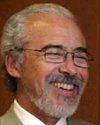 Jean-Jacques Subrenat is a well-travelled academic, researcher and diplomat. He spent three years in the French navy before becoming a student in Bordeaux and Paris, then a scientific researcher in Paris and Kyoto. From there he joined the French diplomatic service in 1972, spending the last ten years of his service, up until 2005, as an ambassador.
Over the course of his career, Jean-Jacques has worked in the ministry of foreign affairs, the ministry of industry, as diplomatic adviser to the Minister for Europe, director for Asia and the Pacific, alternate director for development aid, and alternate director for the Americas. He has served as an ambassador in Brussels, Estonia and Finland.
He is currently chairman of the advisory board of Institut Pierre Werner in Luxembourg, a tutor at the ENA (Ecole nationale d'administration) in Strasbroug, and a board member of the Lycée Vauban in Luxembourg.
Mr Subrenat has a doctorate from the Sorbonne University in Paris as well as other degrees from Bordeaux, Paris and Osaka. He is frequently invited as a speaker and writes articles on global trends, current affairs, international relations and social matters. He is remarried with four children.
"ICANN faces a number of challenges. For example, enlargement of the worldwide Internet community makes ensuring a reliable network paramount; and proper representation will require further imagination and fairness.
"But governance of the Internet could also serve as an example in meeting other global challenges such as access to clean water, food in the face of a rising world population, or energy use and supply. I'm looking forward to the job ahead."
|
 |
GNSO Council |
|
 |
The Generic Names Supporting Organization (GNSO) is the main policy development arm of ICANN. Its decisions and recommendations are made by the GNSO Council.
There are 18 members of the GNSO Council, comprising three members from each of the GNSO's six constituencies, plus three chosen by the Nominating Committee. There are also two non-voting liaisons, and a chair chosen from the Council members.
The Nominating Committee 2007 chose two new Council members this year, who will both serve two-year terms. They are:
Olga Cavalli (Argentina, Latin America & Caribbean)
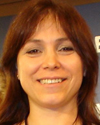 Olga Cavalli is a government advisor, academic and notable figure in Latin America's Internet community. She is a professor at the University of Buenos Aires, where she teaches technology and public policy.
In the private sector, Olga has worked as a consultant for companies and non-governmental organizations in Argentina, Brazil, Chile, Uruguay, Venezuela, USA, Canada and Germany. She is fluent in English, German and Portuguese.
As an advisor to the Argentine Ministry of Foreign Affairs, Ms Cavalli represented Argentina both at the WSIS second phase and in the GAC. She has also been involved in the ccNSO. Ms Cavalli is a key member of eLAC 2007, and a member of the Advisory Group for the Internet Governance Forum (IGF).
She holds a degree in Electronic and Electric Engineering from Mendoza University, an MBA from the UCEMA in Buenos Aires, and a masters in Telecommunication Regulation from the University of Buenos Aires. She is currently working towards a PhD in Business Administration. She has two children.
"What will happen with new gTLDs and what influence that may have in my region and with our culture - that is a subject that interests me a lot.
"I also teach organizational structure at the university and I find it very interesting how ICANN is structured because it is quite open and unique. I am interested in gaining a better understanding of how the different groups interact."
Avri Doria (USA, North America)
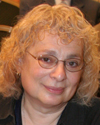 Avri Doria is a familiar face within Internet governance circles and is currently chair of ICANN's GNSO council.
An adjunct professor at Lulea University of Technology in Sweden, she works as a consultant to the Internet Governance Forum (IGF) and is an associate with Interisle consulting.
Avri has been involved in the development of Internet protocols and architectures for over 25 years. She was an active participant in the IETF, chairing the IRTF Routing Research group and serving on the Multi Service Forum. Most recently, she participated in WSIS and post-WSIS civil society, chaired the civil society Internet Governance caucus, and was a member of the Working Group on Internet Governance (WGIG).
Ms. Doria holds masters' degrees in Philosophy (from the University of Chicago) and Counseling Psychology (from Rhode Island College). She is currently working on a trans disciplinary PhD dissertation at Blekinge University of Technology on the relationship between technology and governance. She is also researching methods of bringing the Internet into isolated areas, as part of which she is working with the semi-nomadic Sámi population of Lapland.
"What really interests me now, and why I applied for another term, is the GNSO reorganization. It's vital that is done in such a way as to get wider constituency participation, including individual registrants. That is something that I'd like to see happen."
|
 |
At-Large Advisory Committee (ALAC)
|
 |
 |
The At-Large Advisory Committee (ALAC) represents the interests of individual Internet users within ICANN.
The Committee comprises 15 members - three from each of five geographic regions. Two members from each region chosen by its Regional At Large Organization (RALO) and the third in each case is selected by the Nominating Committee. A chair is selected annually by the members.
Three of the five NomCom places were filled this year and the successful applicants will serve two-year terms. They are:
Vanda Scartezini (Brazil, Latin America & Caribbean)
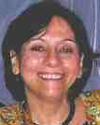 Vanda Scartezini is a high-profile figure both within the Brazilian Internet community and ICANN itself. She is currently a member of the ICANN Board and will leave the post at the same time she takes up her place on ALAC.
An electronics engineer, Vanda has held a number of management positions with private technology companies and public institutions. She is the co-founder of Brazilian IT consulting company Polo Consultores and also acts as President of Altis, a software and service outsourcing company. She is chair of the board of research company FITEC; an associate partner of Getulio Vargas Foundation Projects and member of the board of ABES, the Brazilian Software Industry Association.
Ms Scartezini served as National Secretary of both Industrial Technology and Information Technology in the Brazilian government. She is a former president of the Brazilian patent office, and acted as Brazil's GAC representative for four years until March 2004.
Ms Scartezini has acted as Brazil's government representative in international missions around the world as well as acted as a consultant for a number of international institutions. Honored with many of the major prizes in the Brazilian IT Industry, she is also the co-author of a number of books on ICT and the author of several papers on ICT and intellectual property issues.
"ALAC is in an interesting and challenging process to become much more representative of users around the world. Having worked with ICANN for about seven years now, passing through GAC and GAC Vice chair, the Board and its committees, I guess I can both learn from ALAC members and add some value through my previous experience.
"I also think the Fellowship Program is of huge importance for the future of ICANN, so it makes sense to be at ALAC to encourage these new fellows to join RALOs and spread the ICANN community spirit around their regions. I welcome my new colleagues and I bet on our success together!"
Fatimata Seye Sylla (Senegal, Africa)
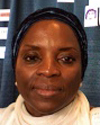 Fatimata Seye Sylla is a key figure in the Senegalese Internet community. She worked for ten years within the Senegalese government, and for 9 years in the private sector. She conducted the first national project to introduce ICT in the educational system.
Fatimata obtained her first degree, in Computer Science, from Le Havre University and has a post graduate Management degree from the African regional management school in Dakar. She is also an MIT/ Media Lab Master of Science.
As an international consultant in the field of ICT use in education, gender, media and development, she has worked for a number of United Nations agencies as well as the International Development Research Centre (IDRC) and the Panos Institute. She was a Board Member of CATIA (Catalysing Access to ICTs in Africa).
Mrs Seye Sylla is a founding member and Board member of OSIRIS, a non-governmental organization aimed at promoting ICT use in Senegal, as well as ISOC in Senegal. She is presently the National Coordinator of the African Civil Society for the Information Society (ACSIS) in Senegal, and a council member of Free and Open Source Software Foundation for Africa (FOSSFA).
"I think one of the main challenges for ICANN is how to have developing countries more involved, and not only on the technical side. The Internet is used more and more for development, and ICANN needs to be a part of that."
Nguyen Thu Hue (Vietnam, Asia/Australia/Pacific)
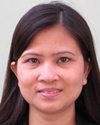 Nguyen Thu Hue is a lawyer by training and plays active role in the development of Vietnam's Internet. She has a degree in Economic Law from Hanoi Open University and a Masters in International Business Administration from the Asian Institute of Technology (AIT).
Nguyen also studied Internet Law at Harvard Law School, and held a position at the Hanoi office of Baker & McKenzie, an international law firm.
For two years, Ms. Nguyen was country coordinator for the Global Internet Policy Initiative (GIPI), an EU-funded project on internet policy reform in Vietnam. She was also program coordinator for the USAID-funded project "Internet Training for Female NGO Heads and Female journalists in Vietnam".
Ms Nguyen is the founder and director of the Center for Marinelife Conservation and Community Development (MCD), a Vietnamese non-governmental organisation. Prior to that, she worked as the country coordinator for the International Marinelife Alliance (IMA). She is married with two children and lives in Hanoi, Vietnam..
"I was happy but also a little worried when I heard I had been chosen for the ALAC role. Happy because I can use my experience and time to help the Committee; worried because I see the need to balance across cultures while in ALAC. I think I can act as a bridge between the Committee and the Asia-Pacific region that I represent."
|
 |
ccNSO Council |
|
 |
The country code names supporting organisation (ccNSO) develops policy and makes recommendations relating to country-code top-level domains within ICANN. Its decisions are made by the ccNSO Council.
The Council comprises 18 members - three from each of five geographic regions, plus three chosen by the Nominating Committee. Members of the ccNSO from each region select their three represenatives. A chair is selected annually by the members.
One of the three NomCom places was filled this year and the successful applicant will serve a three-year term. That person was:
Nashwa Abdel-Baki (Egypt, Africa)
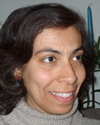 Nashwa Abdel-Baki was one of the pioneers in Egypt's Internet, helping to build national networks both locally and regionally.
She holds a BSc from the Faculty of Engineering, Cairo University; an MSc from the Faculty of Engineering, Ain Shams University; and a Doctorate of Engineering from Ulm University, Germany.
After graduating from Cairo University in 1983, Nashwa joined the Egyptian Supreme Council of Universities (SCU) as a systems engineer, a position she held for ten years. She been a driver behind a number of international IT conferences and networking workshops relating to building and managing national networks, and played an important role in the establishment of the African Regional Network Information Centre (AfriNIC).
In 2000, Dr Abdel-Baki was awarded a German Academic Exchange Service (DAAD) scholarship, leading a five-year research program. She is currently vice executive director of the Egyptian Universities Network, and an IT advisor to the Secretary General of the SCU.
"I am hoping to help in a number of dimensions. There is the promotion of IDNs, the promotion of country codes, and then also getting across to people the importance of ICANN. Egypt is still not a member, for example. Many people have heard of the organisation, but not many have realised its importance."
|
|
| |
 |
|
| |
|
|

